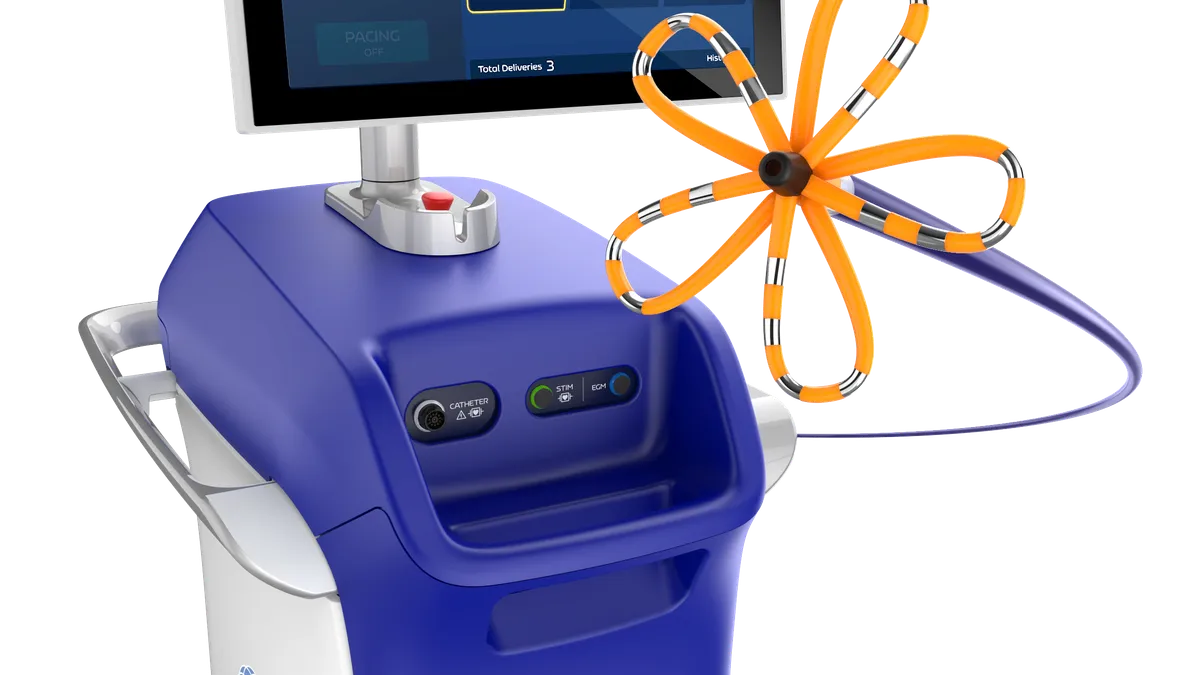Cardiologists say they expect to embrace use of pulsed field ablation to treat heart arrhythmias after a recently published study showed Boston Scientific’s Farapulse device performs as well as thermal ablation.
The technology, which uses pulses of electricity to scar heart tissue, is intended to interrupt abnormal electrical signals that can cause arrhythmias. Part of the promise of PFA is that it could lead to quicker procedure times and carry a lower risk of complications than other forms of cardiac ablation that use heat or cold.
“This technique will limit the possibility of collateral damage to surrounding structures compared with thermal ablation technologies,” Mohit Turagam, a cardiac electrophysiologist at Mount Sinai Hospital and an associate professor at the Icahn School of Medicine, wrote in an email.
Turagam added that the study results “are quite favorable considering that the majority of the operators in the trial used this technology for the first time.”
Boston Scientific’s Farapulse device worked as well as thermal ablation in treating paroxysmal atrial fibrillation, a type of arrhythmia characterized by intermittent episodes of irregular or rapid heart rhythm.
It also proved to be as safe as the standard of care. One patient died from a puncture due to manipulation of the ablation catheter, but the study’s chief investigator cautioned against extrapolating that result, pointing to the device’s safety record in a prior registry study of more than 1,500 patients.
The procedures done with PFA were faster than those done with thermal ablation, but they also included more X-ray exposure, Turagam said.
“The ease of use of this technology combined with the excellent safety are the major reasons to use this technology in the future,” the physician said.
PFA could become half of all cardiac ablation
A recent survey of 25 cardiologists by BTIG analysts indicated that pulsed field ablation may outpace other technologies designed to treat atrial fibrillation in the coming years.
“It seems most operators view this [randomized clinical trial] as validation of the new technology class and plan to start using the various systems soon after commercial availability,” the analysts wrote in a research note on Tuesday.
The cardiologists said they had used PFA in about 3% of cardiac ablation cases, largely through clinical studies. Radiofrequency ablation was used in 77% of cases, and cryoablation was used in about 19%.
PFA is expected to be used for half of ablation cases three years after the first devices are launched in the U.S., the analysts wrote. Boston Scientific is poised to be one of the first companies to bring the technology to market.
Boston Scientific CEO Mike Mahoney said in a July earnings call that the company expects its Farapulse device to receive approval from the Food and Drug Administration next year, and it is building up manufacturing capacity to meet demand in Europe and Asia. The company has not yet shared any sales projections. Boston Scientific bought Farapulse in 2021 for $295 million.
Medtronic, which bought cardiac ablation company Affera for $925 million last year, is also competing to bring its PFA systems to the U.S. Medtronic received a CE mark for the Affera mapping and ablation system in March. The company also filed for FDA approval of a separate ablation device, called PulseSelect, and it expects to be one of the first companies with a PFA catheter in the U.S., CEO Geoff Martha said in an August earnings call.
The BTIG analysts estimate that three years after the first PFA devices are launched, Boston Scientific’s Farapulse device will have a leading market share of 16%, followed by Biosense Webster’s Varipulse device at 13%, Medtronic’s PulseSelect at 10% and its Affera Sphere-9 device at 7%.
“This matches what we have heard in diligence over the past four years, including an expectation that PFA will quickly become standard of care and that there will be more than one winner in the PFA race,” they added.
Ablation procedures increase
Earlier detection of atrial fibrillation, an aging population and more treatment options are also driving broader growth across the $8 billion global electrophysiology market, RBC Capital Markets analyst Shagun Singh wrote in a research note.
She estimated the U.S. market for atrial fibrillation treatment at $2 billion and expects it to grow to more than $5.5 billion by 2026, with an expected procedural shift to pulsed field ablation and a price premium that the new devices may carry.
“We estimate that PFA could garner a 2x price premium versus conventional catheters,” Singh wrote.
With their ease of use and safety, the devices could allow a specialist to perform one additional procedure daily, the analyst said. Singh expects some procedures would shift from cryoablation first, and then from radiofrequency ablation.



















